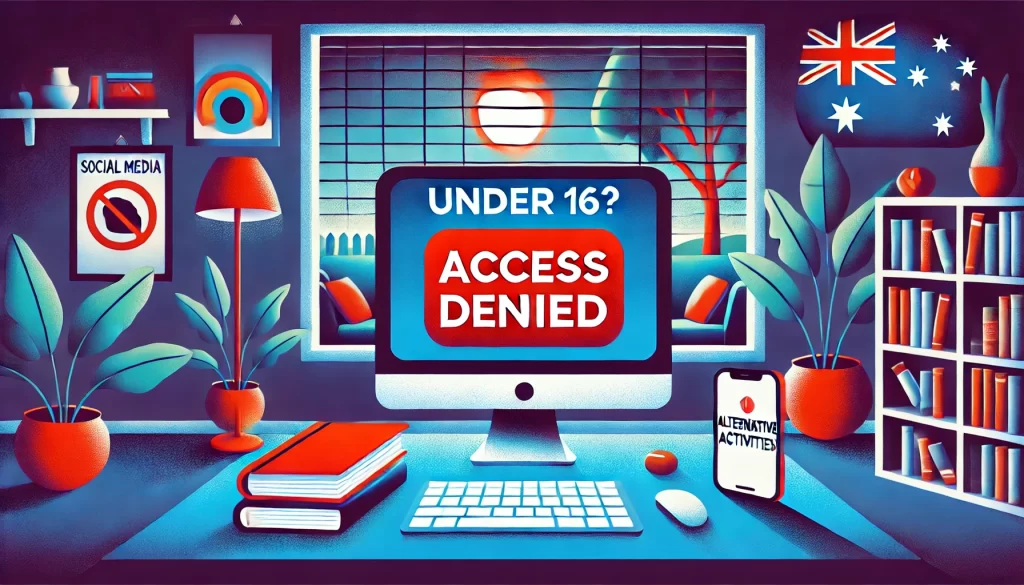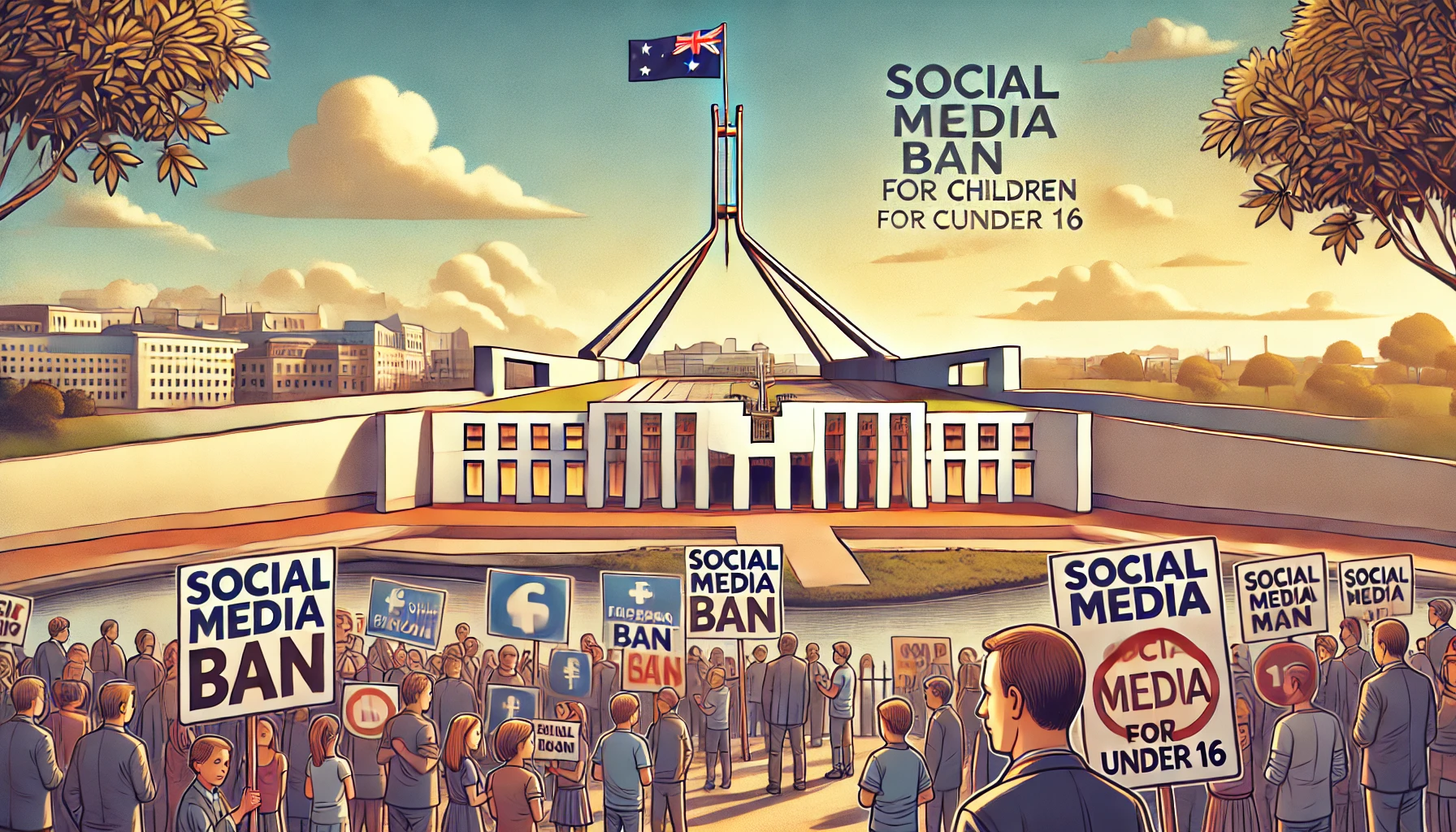Australia has made history by becoming the first country to pass a law prohibiting children under 16 from creating accounts on major social media platforms. This world-first legislation, approved by the Australian Parliament in November 2024, is designed to protect young people from the dangers of online content and to hold social media companies accountable for their users’ safety.
Key Features of the New Law
The law requires platforms such as TikTok, Facebook, Instagram, Snapchat, Reddit, and X (formerly Twitter) to take “reasonable steps” to verify users’ ages and prevent underage accounts. Platforms failing to comply could face fines of up to AUD 50 million (approximately USD 33 million).
Privacy concerns were addressed in the bill’s final version, ensuring platforms cannot mandate government-issued IDs, such as passports or driver’s licenses, for age verification. Instead, companies may use alternative methods like artificial intelligence to estimate a user’s age based on their behavior or facial scans.
Exemptions were made for educational and health services such as YouTube, WhatsApp, Messenger Kids, Google Classroom, and Kids Helpline. These platforms are considered vital for learning and support. Furthermore, under-16s will still be able to access content on platforms like TikTok and Reddit without registering for accounts.
Social media companies have been granted a one-year grace period to implement the changes before penalties are enforced.
Aims of the Legislation
Prime Minister Anthony Albanese highlighted the law’s focus on safeguarding children, emphasizing that tech companies must now prioritize safety over profits. “Platforms now have a social responsibility to ensure the safety of our kids is a priority for them,” he said.
Michelle Rowland, the communications minister, pointed to the harmful content children often encounter online—ranging from drug abuse to eating disorders—and described the legislation as an essential step in mitigating such risks. Rowland stated that the restrictions are intended to protect children without punishing or isolating them.
Supporters argue that delaying children’s exposure to social media gives them time to develop a “secure identity” and eases the burden on parents who currently feel responsible for monitoring their children’s online activities.
Public and Parental Support
The law has garnered widespread support among Australians, with polls showing significant public approval. Many parents have campaigned for stricter regulations after witnessing the negative effects of social media on their children. Tragic cases, such as Kelly O’Brien’s 12-year-old daughter Charlotte, who died by suicide following bullying on social media, have fueled calls for change. “We’re giving them weapons,” O’Brien said, referring to the potential harms of early access to social media.
Sonya Ryan, a prominent safety advocate whose daughter Carly was murdered by an online predator, described the law as a “monumental moment in protecting our children from horrendous harms online.”

Controversies and Criticisms
Despite its positive reception in many quarters, the law has sparked significant debate. Critics argue that it was rushed through Parliament without adequate scrutiny. Human rights groups and tech companies have raised concerns about privacy risks and the potential ineffectiveness of the law.
Senator David Shoebridge, from the minority Greens party, criticized the ban for potentially isolating vulnerable children, particularly in regional areas and LGBTQ+ communities, who rely on social media for support networks. “This policy will hurt vulnerable young people the most,” Shoebridge said.
Experts have also questioned the law’s reliance on emerging technologies for age verification. Daniel Angus, director of the Digital Media Research Centre, noted the unreliability of AI-based systems and raised concerns about privacy and tracking issues.
Some commentators have dismissed the law as performative. Annabel Crabb, an Australian journalist, described it as a political move designed to make it appear that Parliament is addressing parents’ concerns.
Response from Tech Companies
Social media companies have expressed reservations about the legislation. Meta, the owner of Facebook and Instagram, criticized the law as overlooking the complexities of age-verification technology. Snapchat shared its concerns but pledged to work with Australian regulators during the one-year implementation period.
Elon Musk, the owner of X, called the law “a backdoor way to control access to the internet by all Australians.”
Digital Industry Group Inc., representing major platforms in Australia, argued that the legislation lacked clarity and was rushed through Parliament. “No one can confidently explain how it will work in practice,” said Sunita Bose, the group’s managing director.
Challenges Ahead
The enforcement of the ban presents numerous challenges. The government has yet to specify which platforms the law will cover, and critics warn that its patchwork nature may lead to inconsistencies. Some argue that the law may inadvertently drive children to riskier online spaces or the dark web, undermining its protective intent.
Supporters, however, maintain that the legislation is a necessary first step in addressing the broader issue of online harm. Online safety campaigner Wayne Holdsworth, whose teenage son died by suicide after an online scam, said the law gave him “immense pride as an Australian.”
A Landmark Decision
While the law marks a significant shift in how governments regulate social media for minors, it also raises questions about the balance between privacy, safety, and practicality. Whether Australia’s bold move will inspire similar actions worldwide or highlight the difficulties of regulating digital spaces remains to be seen. For now, the country’s ambitious legislation sets a new standard in the ongoing debate over children’s safety in the digital age.
This article is based on the following articles:
https://www.npr.org/2024/11/28/g-s1-36142/australia-social-media-ban-children
https://www.nytimes.com/2024/11/28/world/australia/australia-social-media-ban.html

Background Information
What is Social Media?
Social media platforms are websites and applications where people can create profiles, share photos and videos, post updates, and interact with others. Popular examples include Facebook, Instagram, TikTok, Snapchat, and Reddit. While social media allows people to connect and share ideas, it can also expose users to risks such as cyberbullying, misinformation, or inappropriate content.
Why is Social Media Popular Among Young People?
Social media appeals to young people because it offers:
- A sense of connection: Many kids use platforms to chat with friends, join online communities, and feel connected to others.
- Entertainment: Platforms often feature fun content, including videos, memes, and games.
- Self-expression: Teens use social media to share their interests, talents, and opinions.
- Support and information: Some young users find advice and support on issues like mental health, schoolwork, or hobbies.
However, overuse of social media can negatively affect mental health, sleep, and school performance.
What Are Online Risks for Kids?
While social media offers many benefits, it also comes with risks:
- Cyberbullying: Bullying or harassment that happens online, which can make children feel unsafe and upset.
- Harmful content: Children might see posts about violence, drugs, eating disorders, or other topics that are not age-appropriate.
- Strangers: Social media allows people to connect with others worldwide, but this also means kids could be contacted by strangers with bad intentions.
- Privacy issues: Kids may accidentally share personal information, like their location or phone number, with people they don’t know.
What Are Governments Doing About It?
Governments worldwide are trying to make the internet safer for children by passing laws that protect their privacy and reduce risks. Examples include:
- The U.K.’s Age-Appropriate Design Code: A law requiring platforms to prioritize the privacy and safety of users under 18.
- U.S. efforts: Proposed laws like the Kids Online Safety Act aim to address online risks for American children.
Australia’s new law is unique because it focuses specifically on banning underage accounts, making it the first law of its kind.
How Are Social Media Companies Held Responsible?
Social media platforms are private companies that make money by keeping users engaged, often through advertisements. Governments sometimes create laws to ensure these companies act responsibly. For example:
- Platforms may be required to remove harmful content.
- Companies could face fines if they don’t protect users’ safety.
- Laws might force platforms to use age-verification technologies to stop young children from signing up.
What Is Age Verification?
Age verification is a way to confirm how old someone is. For social media, this can involve:
- ID verification: Using official documents like a passport or driver’s license.
- AI technologies: Tools that estimate a user’s age based on their behavior or appearance.
- Parental controls: Some platforms allow parents to set up and monitor accounts for their children.
However, these methods are not always reliable or practical, and they raise concerns about privacy.
Why Do Laws Sometimes Face Criticism?
Creating new laws can be complex. Critics of laws like Australia’s social media ban often raise concerns such as:
- Privacy issues: Asking for proof of age might require sensitive personal data.
- Effectiveness: Some argue that banning underage users doesn’t address harmful content that exists on platforms.
- Rushed decisions: Laws passed quickly may not account for all possible consequences.
What Is the Legislative Process?
In democratic countries like Australia:
- Proposal: A law begins as a bill, an idea proposed by lawmakers.
- Debate: Lawmakers discuss and sometimes revise the bill.
- Voting: Both houses of Parliament vote to approve or reject the bill.
- Enactment: If the bill passes, it becomes law.
Australia’s social media ban for children under 16 went through these steps quickly, which some critics argue didn’t allow for enough debate or consideration.
Why Does This Matter?
Understanding this topic is important because it shows how governments try to balance safety and freedom in a digital age. As technology changes, rules may need to evolve too, raising big questions about what’s best for everyone, especially young people.

Debate/Essay Questions
- Is it realistic to rely on technologies like AI for age verification?
- Will restricting access to social media improve children’s mental health, or could it deprive them of valuable online support networks?
- Should governments regulate children’s access to social media, or should this responsibility be left to parents?
Please subscribe to Insight Fortnight, our biweekly newsletter!
